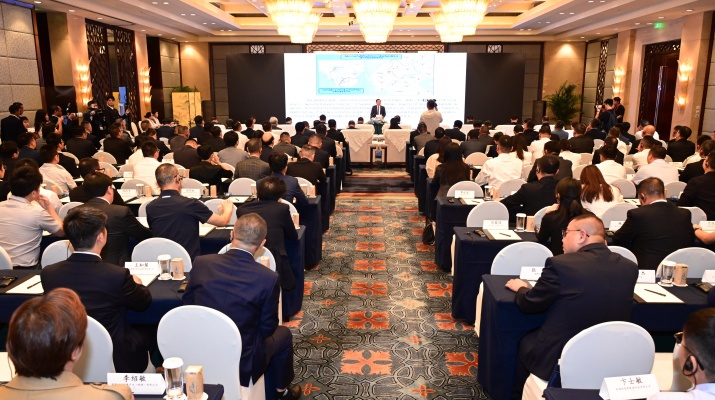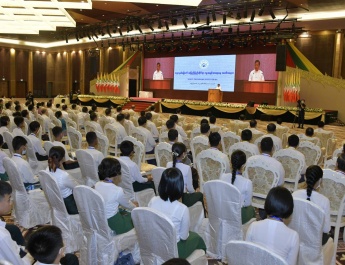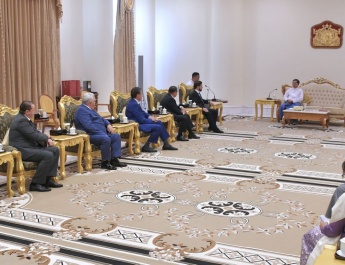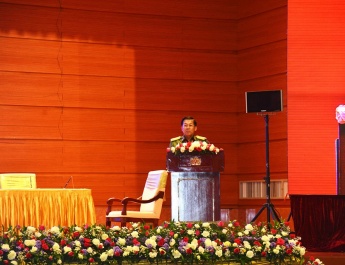NAY PYI TAW September 6
Acting President of the Republic of the Union of Myanmar, Chairman of the State Security and Peace Commission of the Republic of the Union of Myanmar, Senior General Min Aung Hlaing deli-vered a speech at the second meeting of the Myanmar-China economic cooperation promotion at Shangri-La Hotel in Chengdu, Sichuan Province, the People’s Republic of China, at 1 pm Chinese standard time today.
Also, present at the meeting were members of the Myanmar delegation, the Chinese Ambassador to Myanmar, the Myanmar Ambassador to China, the president and members of the Union of Myanmar Federation of Chambers of Commerce and Industry (UMFCCI), those wishing to invest in Myanmar and investors, Chinese businesspersons and economists from Yunnan Province, Sichuan Province, Chongqing Munici-pality and Hunan Province and officials, totalling more than 120.
Speaking at the meeting, the Acting President and SSPC Chairman of the Republic of the Union of Myanmar said that as Myanmar and China share a border of more than 1,300 miles, it is important for economic, social, border trade, infrastructure development, improved transportation links, and peace and stability in the border areas. Diplomatic relations between the two countries were established in 1950, and since then, their relations have grown to the level of a comprehensive strategic partnership and close, fraternal ties as good neighbours. In particular, economic cooperation between the two countries has expanded, especially in trade and investment, as well as in various other sectors. In 2011, the Myanmar-China Comprehensive Strategic Cooperative Partnership was launched, which opened up positive prospects for economic and trade cooperation, leading to a significant increase in bilateral trade and investment.
China is Myanmar’s largest trading partner and the second-largest investor among 53 countries investing in Myan-mar. The total trade value between the two countries amounted to over US$-8 billion in financial year 2023–2024, over US$-7.7 billion in FY 2024–2025, and over US$-3 billion up to July of FY 2025–2026, reflecting the strong and stable trade relations between the two countries. Myanmar mainly exports agricultural products such as rice, various types of beans and pulses, and sesame, as well as raw materials like rattan and hardwood, along with wood-based finished products to China. In addition, Myanmar is striving to produce higher value-added wood-based products for distribution in both domestic and international markets. Both countries have expressed the intention to further expand bilateral trade and investment.
Since our two countries share a common border, border gates play an important role in trade. Under the bilateral agreement on border region manage-ment and cooperation, there are a total of eight border trade gates along the Myanmar-China border. At present, due to security conditions, only the Muse–Ruili gate remains open, while the other border trade gates have been suspended as a result of armed terror attacks by ethnic armed groups, which has negatively affected bilateral trade. As border trade directly contributes to the socio-economic development of the peoples of both countries, it is necessary to cooperate as much as possible to ensure stability and peace in the border areas and to enable the resumption of trade activities.
At present, instability in the Myanmar-China border areas has also affected the economies of Yunnan Province, Sichuan Province, and Chongqing Municipality. If the border gates between the two countries can be reopened, not only will the flow of goods improve beyond previous levels, but trade routes can also be expanded from Myanmar’s northeastern region to Yunnan, Sichuan, Chongqing, Guangxi, and Nanning City. This trade route would become a major trade corridor for both Myanmar and China, while also serving as a land bridge linking China’s southeastern, central, and southern regions to Myanmar, and further connecting to ASEAN countries for economic and trade cooperation. Therefore, it is essential for both countries to prioritize cooperation in ensur-ing stability and security in the border areas. Once trade routes are restored and expanded, both sides will be able to further increase the variety of goods and value-added products for export, improve and extend transportation infrastructure, and continue efforts to attract greater investment.
With China’s support, projects are being implemented in Myanmar for socio-economic development in the fields of education and healthcare, and for infrastructure development in sectors such as electricity and energy, agriculture, industry, and transport and communications sectors. Since Chengdu is the main economic centre in western China, there are many opportunities for cooperation with Myanmar in trade, technology, tourism, energy, and other sectors. Chengdu hosts numerous enterprises, including electronics and IT companies such as Intel, Foxconn, and Dell, as well as industries engaged in automobile manufacturing, food pro-
cessing, and pharmaceuticals. Chengdu is making significant progress in the technology sector, and it has been designated as the first pilot zone for AI innovation and application in western China. In this regard, Myanmar would like to pursue cooperation with these industries.
At present, there are many sectors in which Myanmar and Sichuan Province are cooperating. To strengthen colla-boration in areas such as economic development, trade, infrastructure construction, agriculture, healthcare, and education between Sichuan Province and Mandalay Region, plans are underway to sign a memorandum of under-standing to establish a framework for friendly and cooperative relations. Similarly, a memorandum of understanding is also planned to be signed between Chengdu and Yangon, Myanmar’s commercial hub, to establish a sister-city rela-tionship based on goodwill. In addition, efforts are being coordinated to further enhance economic and trade cooperation between Myanmar and Sichuan Province, promote tourism, cultural exchanges, and people-to-people interactions, and to resume the Yangon–Chengdu passenger air routes that were suspended during the COVID-19 pandemic.
Myanmar is a country with significant trade opportunities because it shares borders with the world’s most populous countries, China and India, as well as the densely populated Bangladesh. Furthermore, Myanmar is geographically situated at the strategic confluence of South Asia, Southeast Asia, and China. In terms of connectivity, it is located at a crossroads and can serve as a country that creates an outlet to the Indian Ocean for China. Therefore, we would like to highlight that the transportation and infrastructure sectors hold substantial potential for China.
We would like to mention that Myan-mar is participating in the Belt and Road Initiative (BRI), led by China. This initiative consists of two main pillars: the Silk Road Economic Belt, which is the overland route connecting China with European countries, and the 21st Century Maritime Silk Road, which is the sea route connecting Southeast Asia, Africa, and Europe.
The BRI includes six international corridors. Myanmar is involved in two of them: the Bangladesh-China-India-Myanmar (BCIM) Economic Corridor, which can utilize both road and sea routes, and the China-Indochina Peninsula Economic Corridor. Myanmar is the largest mainland country in Southeast Asia and is strategically important geopolitically. It is also a part of both the Asian Highway and the Trans-Asian Railway networks, making it a crucial country within the Belt and Road Economic Sphere. Under this initiative, the China-Myanmar Economic Corridor (CMEC) has been established. Efforts are underway to facilitate trade and investment and to create special economic cooperation zones in border areas. Under the CMEC framework, six Early Harvest Projects are being implemented.
We would like to speak about the projects being implemented between the two countries under the China-Myanmar Economic Corridor. China is working on many important projects in Myanmar, such as the Kyaukphyu Deep Seaport Project, the China-Myanmar Railway Project, and the China-Myanmar Cross-Border Power Grid Project. Among these, the China-Myanmar Railway Project is a significant initiative that can yield excellent benefits for border trade between our two countries.
If these railway projects are success-fully implemented and enable trade, we see good potential for trade to extend even to the Russian Federation. Although geographically distant from us, Myanmar maintains good relations with Russia. Myanmar is centrally located between Russia, China, and India—countries that span both Asia and Europe—making it a strategic hub for trade and economic activities. We have already opened Myanmar Consulates-General in Novosibirsk, a central hub in Russia, and in St. Petersburg, a European seaport city, hoping to increase the flow of goods between our two countries. We also have Consulates-General in Chongqing, Kunming, Nanning, and Hong Kong in China, which will help smoothly promote bilateral trade. Since China is located between Myanmar and Russia, if Myanmar, China, and Russia can collaborate to expand trade, it could create excellent opportunities that greatly facilitate regional goods flow.
Myanmar was one of the first countries to ratify the Regional Comprehensive Economic Partnership (RCEP) agreement. China has confirmed that Myan-mar’s participation in the RCEP agreement came into effect on May 1, 2022. Besides RCEP, due to the China-Myanmar Bilateral Investment Treaty, the ASEAN-China Free Trade Area (ACFTA) agreement, and the protections and facilitations under Myanmar’s invest-ment law, we believe that cooperation between our two countries, as well as regional collaboration, will be solidly strengthened.
Within the eight priority areas of the Global Development Initiative (GDI), led by China, there are many sectors suitable for Myanmar. Therefore, our country, Myanmar, is one where businesspeople have many opportunities to make investments. To facilitate the operations of our Chinese partner businesspeople in Myanmar, we are implementing a direct Kyat-Yuan payment system for trade, border money transfers, and investments. We wish to further increase trade and investment through the border trade gates between our two countries. Therefore, we have significantly provided benefits and tax exemptions for our partner businesspeople, and we will strive to ensure that those who come to invest and trade in Myanmar do not suffer losses. Furthermore, to develop investments between Myanmar and China, it is necessary to form a Myanmar-China Businesspeople Cooperation Association and implement measures for rapid business development. We are considering measures to facilitate investment by Chinese businesspeople in Myanmar using the Yuan currency and for direct investment, and we expect to provide an answer soon.
A free and fair election will be held in Myanmar in December and political stability will be stronger. When stability has been restored, business opportuni-ties will improve. natural and human resources and Chinese investments will combine to create significant outcomes for the two countries.
It is my pleasure to get the opportunity to discuss potentials for bilateral cooperation that will be greatly beneficial to both countries with business people, scholars and experts from Myanmar and China. Everyone is invited to invest in economic cooperation in Myanmar confidently. It is believed that relations between the two countries will streng-then and improve cooperation in the future.
Then, Chinese companies that were interested to invest in Myanmar and companies from Yunnan Province, Sichuan Province, Chongqing Municipality and Hunan Province that have already invested in Myanmar discussed relief operations and surveys of organizations from China after the Mandalay Earth-quake, willingness to invest in post-earthquake rehabilitation and solar power generation projects, inquiries about export and import policies adopted by Myanmar, willingness to cooperate in construction industries and digital technologies, the need to accept Yuan direct payment systems for improvement of investments, inquiries about capa-bilities for protection of investments, the need to solve the delays in application processes for imports, willingness to export agricultural machinery and equipment for agricultural works in Myanmar, the need to continue to implement China-Myanmar Economic Corridor and willingness to participate in economic development in Myanmar.
In connection with discussions and inquiries, union minister, who joined the working visit, explained their relevant sectors including measures taken for permissions to invest and to carry out tender works in accordance with rules and regulations, development of solar power generation, willingness to accept investments in Myanmar, permissions for land use for investments in accordance with standards and the Myanmar Fallow, Vacant and Virgin Lands Law, willingness to invite investors to Myanmar to hold negotiations, adoption of policies for hiring technicians, exports of Paw HsanHmwe rice produced in Myanmar to China, application of licenses for imports of machinery for development of garment industry in accordance with rules and regulations, willingness to accept investments for agricultural machinery in Myanmar and to boost agricultural production and bilateral cooperation for CMEC.
Regarding the discussion, the Senior General said Myanmar has been cooperating with the Chinese government for rehabilitation of areas hit by the earthquake. In doing so, construction tasks are being carried out with Chinese companies. Permissions to carry out tasks will be issued if they comply with rules and regulations. Construction tasks for government buildings will be carried out under the State arrangement and Chinese companies are allowed to reconstruct private buildings in cooperation with the UMFCCI. If Chinese companies want to carry out tasks by depositing advance cash, permissions will be granted. Measures are being taken to allow investments through the Yuan direct payment system and negotiations will be held with respon-sible officials to allow the Kyat direct payment system as soon as possible after arriving back in Myanmar. As the Myanmar currency is being sanctioned, the Yuan-Kyat direct payment system will facilitate operations.
Then, the Senior General delivered a concluding speech, stating that the purpose of his visit was to enhance cooperation between the two countries. He said they would discuss economic cooperation with the states bordering Myanmar and work to further improve trade. He emphasized the need for Myanmar to import goods from China and for China to import goods from Myanmar to promote trade. To this end, he noted that efforts are underway to facilitate direct payments between the Chinese yuan and the Myanmar kyat. He also suggested that by purchasing goods from Myanmar, China would enable Myanmar to purchase goods from China in return.
The Senior General stated that the country possesses abundant natural resources, including land, underground, and water resources. He emphasized that mutual trade through border commerce would benefit both nations. He called for cooperation to ensure peace and stability in border regions and announced that Myanmar is arranging to allow investments in yuan. Additionally, he stated that the country would not permit the export of raw materials and would only allow the export of semi-finished or finished goods.
Therefore, he encouraged investors from China to come and invest in Myanmar. He further stated that Myanmar will permit the importation of necessary machinery for manufacturing companies that have invested in the country. The government will also allow existing investors to upgrade their facilities. He concluded by inviting companies to engage in discussions on these matters.
He called for investments in renewable energy projects, specifically solar and hydropower, to protect the environment. He assured potential investors that security protection would be provided. He also expressed confidence that stability and peace would improve after the country’s upcoming elections. He described Myanmar and China as having a “pauk-phaw” relationship, highlighting that they are strategic partners and trusted, genuine friends.
He concluded by inviting Chinese investors to boldly seize investment oppor-tunities in Myanmar.
Then, the Senior General cordially greeted Chinese businesspeople and economic experts.





